Fidel Castro - The African Revolution: When Does It End?
I was watching TV when the announcement of Fidel Castro's death was made. I put up a post on Twitter with one of Fidel Castro's really important quotes about revolution
A revolution is a struggle to the death between the future and the past
Here is the tweet
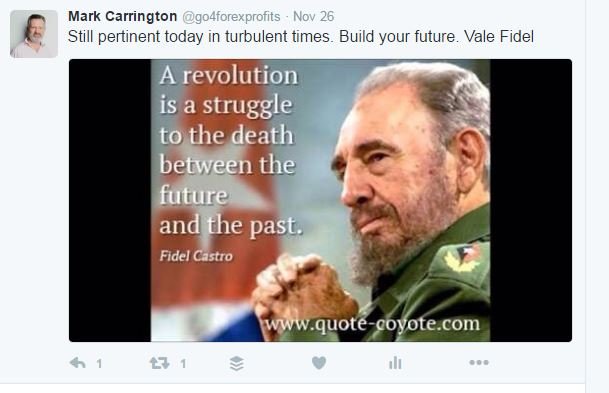
Why did I do that and what was going on in my mind and why did I choose those words? Some of it may seem really obvious.
- We are living in turbulent times. There are a bunch of countries in the middle of revolutions - i.e., the battle between the past and the future.
- Even when the revolution is supposedly over the struggles continue. Maybe this is the way to see the US elections as part of a revolution. It has looked like a battle between the past and the future to us outsiders. Hence the call to BUILD YOUR FUTURE
- Fidel Castro strode the world stage for a very long time. I wished him farewell - note: I did not use words like mourn or RIP or the like. I did not pass judgement on the man in any way.
My tweet provoked a question from one of my followers (M for short). "Why did I not mourn the thousands of people who died under Castro's regime". Now that is a fair question.
You may well be wondering why a Tweeter tweeting about Foreign Exchange and living in Australia chose to post a farewell to Fidel Castro. There are a number of reasons that are not obvious from the outside:
- I thought his death would influence markets - e.g., speed up the re-integration of Cuba into the world economy. From my own portfolios, I have shares in a Cruise company that will add more cruises to Cuba from its base in Miami. This will be good for their business.
- His actions touched my life
So I did a little digging to get some facts about the way Fidel Castro touched my life. I found a Wikipedia article about the South African Border War. This war really started in the mid 1970's and escalated during 1975 after the revolution in Portugal. This revolution was followed very rapidly by revolutions in the Portuguese colonies in Mozambique and Angola. What I wanted to find out is how many lives I needed to mourn in that revolution. You see it was like this. I was a conscripted soldier on one side of the war that followed and I faced Cuban soldiers. Why were there Cuban soldiers in Africa is a good question?. I will leave it to Fidel Castro's words.
Since the very triumph of the Revolution in Cuba we extended our solidarity to the Portuguese colonies in Africa. Liberation movements in that continent had colonialism and imperialism on the rack after World War II and the liberation of the Peoples Republic of China
You will have seen the photograph that has been whizzing around the world of social media that shows the map of the world with all the flags pasted on the countries. Here is a version with the link to its home (I cannot verify whose image it actually is).
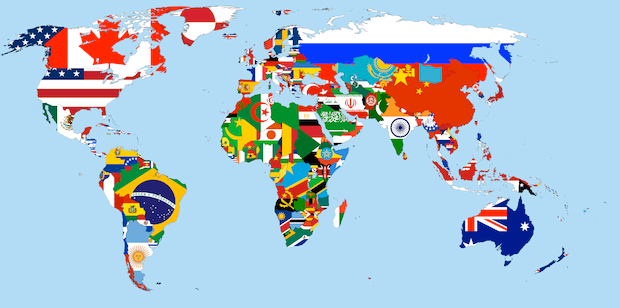
http://geography.name/nationalism/
What that image did is remind me of what my world was in 1975. I was a solider in the South African Army. I was brought up believing that this was my view of the world and I was fighting in a war to keep it that way. And Fidel Castro's soldiers were on the other side of the border in Angola trying to impose a different view of the world.
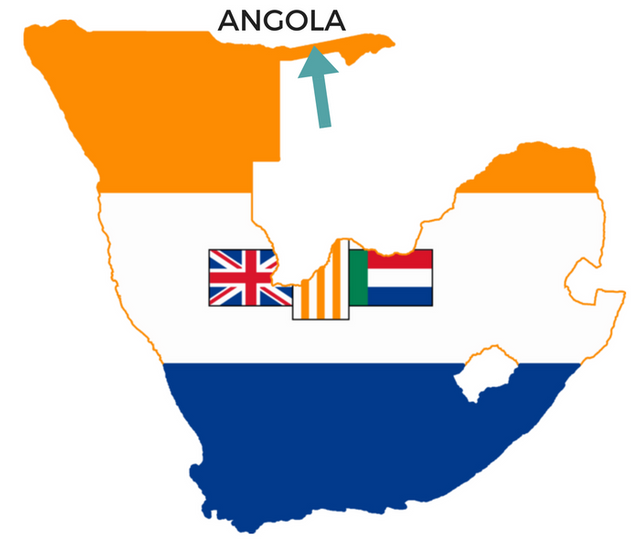
As it happened those events in 1975 did lead to dramatic changes not only in Angola. It took quite some time but there were Cuban soldiers actively involved in Angola right up until a very important battle at Cuito Cuanavale in 1988. Whoever you believe, this was a pivotal event that contributed to the independence of Namibia in 1990 and the release of Nelson Mandela in 1992.
In Fidel Castro's words
It was then that we got the news that the enemy was willing to negotiate. We had succeeded in stopping the imperialist and racist adventure in a continent where, in 30 years time, the population will exceed that of China and India together.
In 1994, South Africans adopted a new democracy and Nelson Mandela was elected President and the country adopted a new nationalism.
You may be surprised to find out but South Africans do not need visas to visit Cuba. Fidel Castro made several visits to South Africa and Cuba moved from number one enemy to good friends. As South African nationals we changed sides.
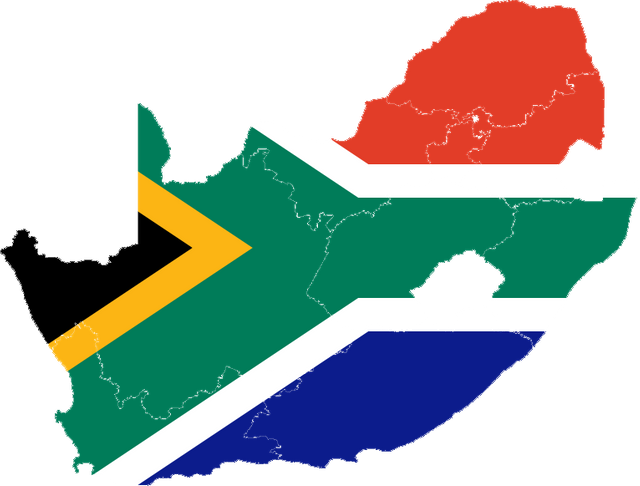
It is over 40 years since Mozambique and Angola became independent. Are their revolutions over? Just two days ago a friend posted a report of a friend being attacked and robbed in Mozambique - the third he had heard of in recent times. It is now over 20 years since the new democracy started in South Africa. Is their revolution over as they struggle to the death between the future and the past? For example, South Africa has the highest per capita homicide rate in the world.
Getting back to my story about M, I shared the Wikipedia South African Border War article with these words. "I faced his soldiers. When did that revolution end?" Here is the link to the article and these were the facts I had been looking for
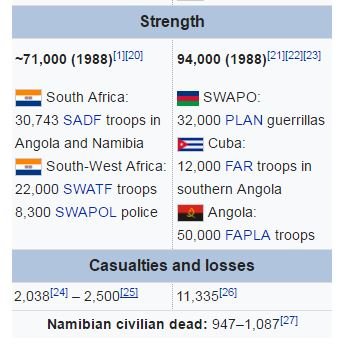
https://en.m.wikipedia.org/wiki/South_African_Border_War
The retort was that it was the "expected non-answer". I will never know if M did read that article or not but I do know he read my reply to his retort. I sent him a photograph with these words. "Article shows 14000 people died in that war. One was my friend. Was that the end? I mourn them all."

This image is a record from the South African War Graves Commission. Tim was my friend - I certainly mourn him. Now that we, South Africans, have changed sides it is only right to mourn all the soldiers (and civilians) on both sides. Ultimately that was my message in my farewell to Fidel Castro - BUILD THE FUTURE.
The image shows that Timothy Chadwick died on June 10, 1975. I am not sure about that date (I think it was earlier) but I do know that on June 19, 1975, I turned 19 - still in uniform. The words of the famous Australian Vietnam War song by Redgum, "I was only 19" rings so true. I did all my service (in that stint on the Angolan Border) as an infantry soldier before I was 19. You may want to listen to the song as you read on the story. There is more.
What many people did not know until Raul Castro (Fidel Castro's brother and now President of Cuba) arrived for that memorial service is that Nelson Mandela and Fidel Castro were very close friends - this was not just one President to another type friends. They were fellow revolutionaries. Fidel Castro took over Cuba in 1959. Nelsom Mandela was imprisoned on Robben Island for revolutionalry activites in 1964.
I watched the Nelson Mandela memorial service in December 2013 and I saw the famous handshake. I said to my wife - this is going to change the world as we know it. The Cuban government website Cubadebate.cu ran the photograph with the words
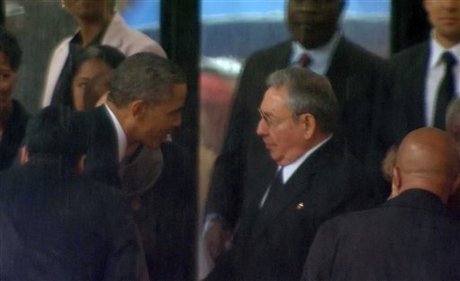
Obama greets Raul: may this image be the beginning of the end of the U.S. aggressions against Cuba.
Image and quote quoting Cubadebate.cu from http://www.naharnet.com/stories/en/109320
Now the quotes in this post about what was happening in Angola from 1975 until 1988 were written by Fidel Castro and published on December 23, 2013 as his message to the world about Nelson Mandela. My impression is he seemed to be stuck in a time warp.
When does the revolution end?
And this brings me to a great post here by @adelja on #steemit which talked about Fidel Castro: The Last Disappointment of the XX Century. This is the quote that really got me thinking
What is left from what the charismatic leader, handsome, smile and brave man who carried in his crazy way, the positive charge on half the world, the energy of the struggle for freedom, the struggle against imperialism, becoming one of the symbols of the second half of the last century in every sense.
https://steemit.com/til/@adelja/the-last-disappointment-of-the-xx-century
Now back to the M story. M did read my post with my memorial for Tim Chadwick. I know he did because he blocked me and deleted my reply. The sad part is nobody else can see the story either. M has chosen to censor a competing point of view. That is why I like #steemit as this cannot happen here (well it can if one does the edits inside the permitted time windows). I was a bit bothered about all of this - M chose to make judgments without knowing my story and my background. He chose also to spread his view of the world to my very large following and to hide it from his very small following. Me on the right (72,900 followers) and him on the left (170 followers)
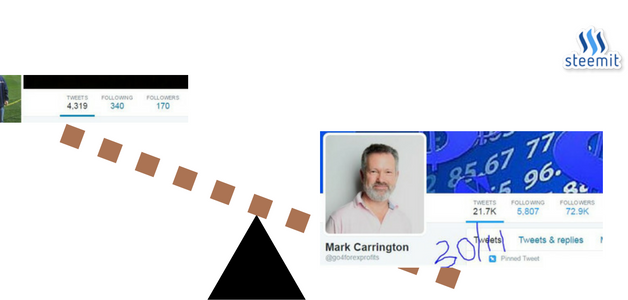
I am sure M has his Cuban story too - it would not surprise me to find that he is a Cuban. I will never know. [Note: I used another account to find out his followers]
I mourn all the people who perished on both sides of their Cuban revolution and both sides of the revolutions I took part in Angola, in Namibia, in Mozambique (I worked there) and in South Africa - my homeland from which I sought exile in 1987 before Cuito Cuanavale happened. We owe it to ourselves and our children to focus on Building The Future
Credits
Old South African flag on the map:
https://commons.wikimedia.org By DrRandomFactor (Own work) [CC BY-SA 3.0 (http://creativecommons.org/licenses/by-sa/3.0)], via Wikimedia Commons. Can be adapted.
New South African Flag
https://commons.wikimedia.org By Flag_of_South_Africa.svg: South Africa Goverment South_Africa_blank_map.svg: *South_Africa_blank.svg: Mangwanani derivative work: Clapsus (talk) derivative work: Shooke (Talk me in spanish, english or italian) 22:04, 10 March 2010 (UTC) [CC BY-SA 3.0 (http://creativecommons.org/licenses/by-sa/3.0)], via Wikimedia Commons
Fidel Castro article
http://en.cubadebate.cu/reflections-fidel/2013/12/23/mandela-is-dead-why-hide-truth-about-apartheid/